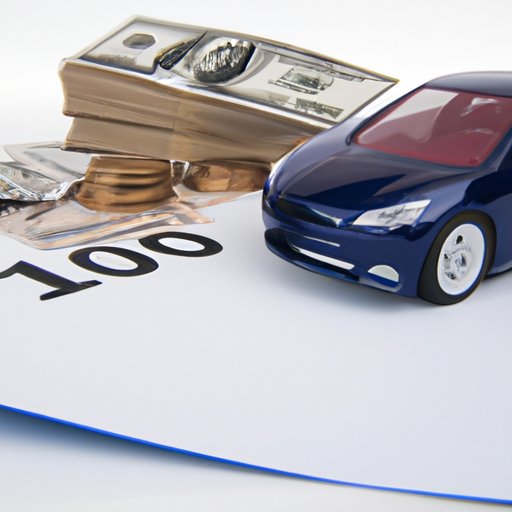Introduction
Buying a car is an exciting yet often intimidating experience. It’s important to understand all aspects of the purchase before signing on the dotted line, including the true cost of ownership. This article will provide a comprehensive guide to understanding the full financial impact of buying a car, from initial costs and ongoing expenses to the total cost of ownership.

A Comprehensive Guide to Understanding the Cost of Buying a Car
The financial impact of purchasing a vehicle should not be underestimated. Whether you’re buying a new or used car, there are numerous expenses that need to be taken into account. Understanding the true cost of a car is essential for budgeting appropriately and avoiding any unexpected surprises.
To calculate the true cost of a car, it’s important to factor in both the initial costs of purchase as well as the ongoing expenses. These include fuel, maintenance, repairs, depreciation, and more. By taking a detailed look at the total costs of automobile ownership, you can make sure you have a realistic understanding of what it will cost to drive away with your new ride.
Breaking Down the Expenses of Buying a Car
Let’s take a closer look at the expenses associated with buying a car. The initial costs are those associated with the purchase itself, such as the down payment, financing fees, taxes, registration, and insurance.
Initial Costs
The initial costs of buying a car can add up quickly. Here’s a breakdown of each expense:
- Down Payment: This is the amount of money you put down when you buy a car. The size of your down payment will depend on your budget and the type of loan you get.
- Financing Fees: If you finance your car, you’ll need to pay interest on the loan. The interest rate and fees will vary depending on your credit score and the lender.
- Taxes and Registration: You’ll need to pay taxes and registration fees when you buy a car. The amount you pay will depend on where you live and the type of car you buy.
- Insurance: Car insurance is a must-have if you want to drive legally. Your insurance premiums will depend on a variety of factors, such as your age, driving record, and the type of car you buy.
In addition to these initial costs, you’ll also need to factor in the ongoing expenses of owning a car. These include fuel, maintenance, and repairs, as well as depreciation.
Ongoing Costs
Here’s a look at the ongoing costs associated with owning a car:
- Fuel: Fuel costs can add up quickly, especially if you drive a lot. The price of gas can also fluctuate, so it’s important to factor this into your budget.
- Maintenance and Repairs: Regular maintenance is important for keeping your car running smoothly. Depending on the type of car you buy, you may also need to pay for repairs.
- Depreciation: Depreciation is the decrease in value of a car over time. New cars depreciate more quickly than used cars, so it’s important to keep this in mind when making a purchase.
What’s the Real Price Tag of a New or Used Vehicle?
When deciding whether to buy a new car or a used car, it’s important to compare prices. New cars are typically more expensive, but they come with certain advantages, such as better warranties and lower repair costs. On the other hand, used cars are usually cheaper and may come with fewer miles on them.
It’s also important to consider the long-term costs of owning a car. While a new car may cost more upfront, it could end up being cheaper in the long run due to lower maintenance costs and less depreciation. A used car, on the other hand, could be cheaper initially, but higher repair costs could make it more expensive in the long run.

A Detailed Look at the Total Costs of Automobile Ownership
If you’re looking to get a better understanding of the total costs of owning a car, you can use a cost of ownership calculator. These calculators allow you to input information about the type of car you’re considering and estimate the total cost of ownership over a certain period of time.
You can also estimate your total cost by adding up all of the initial and ongoing costs associated with owning a car. This includes the down payment, financing fees, taxes and registration, insurance, fuel, maintenance and repairs, and depreciation.
Conclusion
Buying a car is an exciting yet potentially costly endeavor. To avoid any unexpected surprises, it’s important to understand the full financial impact of purchasing a vehicle. This comprehensive guide provides a detailed look at the initial and ongoing costs associated with buying a car, as well as the total cost of ownership.
By taking the time to calculate the true cost of a car, you can make sure you’re budgeting appropriately and getting the best deal possible. Keep in mind that there are several ways to reduce your automobile expenses, such as shopping around for the best financing rates and finding ways to save on fuel and maintenance costs.
(Note: Is this article not meeting your expectations? Do you have knowledge or insights to share? Unlock new opportunities and expand your reach by joining our authors team. Click Registration to join us and share your expertise with our readers.)
